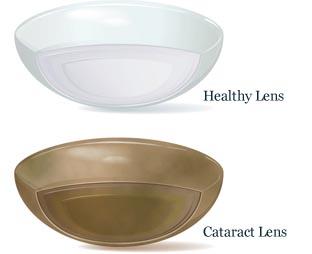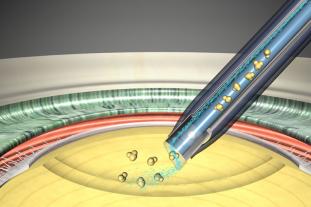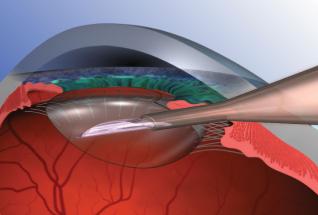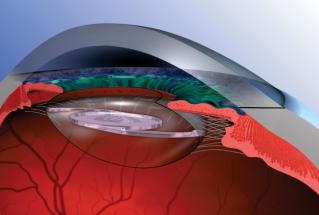Advanced Technology Implants Schedule an Appointment
Contrary to popular belief, a cataract is not a"film" over the eye. Rather, it is a gradual thickening and clouding of the eye’s crystalline lens.

Cataract: A "clouding" of the lens in your eye. Light passing through a cataractous lens becomes scattered, resulting in blurred or defocused vision.
As we age, proteins clump together and begin to cloud a small area of the lens. Over time, the cataract may grow larger, clouding more of the lens, making vision more and more difficult. Eventually, the lens becomes so clouded that light is either distorted or cannot reach the back of the eye (the retina) for transmission to the brain.
What are the Options?
A cataract can progress very slowly. In some cases, the lens will simply thicken without clouding, causing only mild decrease in vision. In these early stages, symptoms can often be addressed with stronger glasses or contact lenses, brighter lighting, or by using a magnifying glass.
But once a cataract has formed, nothing can stop or reverse the process. The only way to completely restore lost vision is through surgical removal of the clouded lens. When vision loss progresses to the point where it affects your daily life and/or safety, lens removal surgery will likely be necessary.
In situations where a cataract is in combination with one or more diseases or conditions, or is interfering with the examination or treatment of other parts of your eye, your doctor may recommend surgery, even if your vision is only mildly impaired.
When a cataract is the only disease present, surgery is usually very successful. In fact, millions of people in the U.S. undergo this vision-saving procedure each year.
For those with cataracts in both eyes, operating on the eye with the poorer vision first is usually recommended. The second procedure will be completed after the first eye has healed.
With other diseases or conditions, the eye care professional usually dictates when surgery or treatments are necessary. But cataract surgery is a decision made by both patient and physician. Because only you know how much your cataract interferes with your quality of life.When it's time, your optometrist or ophthalmologist will refer you to a qualified cataract surgeon who will help you understand your options for treatment.
Cataract Surgery
Cataract surgery is a procedure where a surgeon removes the patient’s clouded natural lens and replaces it with an artificial intraocular lens (IOL). The entire procedure is done on an outpatient basis and typically lasts less than 15-20 minutes. Patients should experience little to no pain and return to their normal activities the following day.
What it isn’t
Cataract surgery is not LASIK, a type of laser surgery in which the cornea is reshaped to improve vision. Cataract surgery actually replaces the lens of the eye with a new, artificial lens.
Phacoemulsification or Small incision cataract surgery
Dr. Epitropoulos makes a small incision at or near your cornea and inserts an instrument about the size of a pen tip to remove the cloudy lens. Once the natural lens is removed, the IOL is inserted through the same incision and set into its permanent position.

Cataract surgery is considered one of the safest and most effective medical procedures. Millions of cataract surgeries are performed each year in the United States. The most advanced and most commonly used technique is phacoemulsification or small incision cataract surgery. It requires a very small incision on the side of the cornea (an eighth of an inch or smaller). Stitches are rarely needed, and the eye heals rapidly. More than 97 percent of phacoemulsification patients experience no complications.


Delaying surgery
You may be able to take some simple steps to delay surgery, depending on the severity of your vision loss. Basic, preliminary steps include getting a new pair of prescription eyeglasses and increasing your home lighting. But before deciding to delay surgery, you'll need to consult your eye care professional and ask yourself how much your cataract is affecting your safety or quality of life.
Call 800.964.9969
If you are interested in seeing your best without glasses, please contact Alice Epitropoulos, M.D., today. We will discuss the benefits, risks and costs. As always, Dr Epitropoulos strives to provide the latest proven solutions to protect and restore vision for you and your loved ones.






